In December 2022, Advance CTE announced the relaunch of an initiative to modernize the National Career Clusters Framework. This work is led by two national partners Indigo Education Company and WestEd and supported by a National Advisory Committee, Industry Advisory Groups, and other avenues to receive input from thousands of professionals connected involved in delivering and experiencing Career Technical Education (CTE) and the Framework. 
The year is 2002:The first iPod had just been released, but we are five years away from the release of the first iPhone.
- Facebook, YouTube, and the Android operating system do not exist.
- Google News is launched
- Over half of US jobs only require limited digital skills
- The current National Career Clusters Framework was established and released to the Career Technical Education (CTE) community.
The year is 2024:
- Total music audio streams passed 4 trillion at the end of 2023.
- Facebook ad revenue total over $130 billion in 2023
- Almost two thirds of adults report getting their news from search engines such as Google
- 92% of job listings require at least one digital skill
The Advancing the Framework modernization initiative in response to growing feedback from the field about the need to align the Framework to the realities of learning and work today and in the future. Educators and industry leaders have told us in national surveys that they want the Framework to be more inclusive of emerging sectors and aligned to the new workplace, and have language that better bridges industry and education.
Our Vision for a New Framework
Imagine a Framework where a learner can take courses in agriculture, entrepreneurship, and unmanned vehicle systems in one program of study. They participate in FFA competitions for agricultural technologies, and earn both a remote pilot’s license and a professional certificate in entrepreneurship. As a result, they start their own business operating drones and digital mapping to help farmers better identify crop water needs, damage, and harvesting schedules.
This modernization is an exciting opportunity to remove silos across industry and education, state and local levels, and across Career Clusters that are keeping learners from being fully prepared for the world of work. A modernized Framework should be flexible for every state and will:
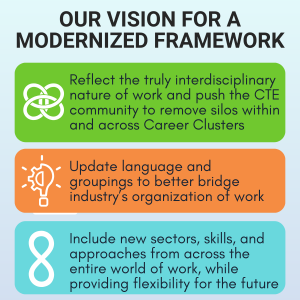
As a result, industry will gain workers with a broader skill set who are more prepared for the workplace. Learners will have more personalized paths to living wage jobs and gain skills for a variety of careers. CTE educators will be able to align and design programs that better reflect the interdisciplinary nature of work, and extend that flexibility to career exploration, work-based learning, and other experiences. And state CTE leaders will be able to build systems, professional development, and resources that are more responsive to industry needs.
The Road Ahead and Opportunities for Input
Currently, we are developing a draft Framework, grounded in labor market data and informed by education and industry leaders across the country. This draft Framework will be available for input from the public this summer. This is the first step on what will be a multi-year journey from 2025 and beyond to finalize, adopt, and implement a new Framework.
Advance CTE is considering and preparing for the impact of a modernized Framework on program of study structure, educator credentialing, state staff structure, Career Technical Student Organization (CTSO) alignment, data collection, legislative initiatives, and more. Once a state does adopt the Framework they will have ample time to implement the Framework and related supports and materials. Advance CTE will work closely with states during the implementation phase providing both general resources and materials and working on state-specific needs that align with the pace at which the state chooses to adopt the Framework.
With your help, everyone in the CTE community will have the opportunity to provide feedback on a draft Framework before it is finalized.Take one of the following steps:
Contact [email protected] for additional information or questions. |
 Kate Kreamer, Executive Director
Kate Kreamer, Executive Director


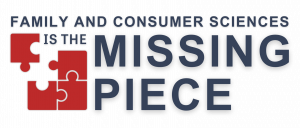 The importance of comprehensive student career preparation for life’s modern challenges is increasingly apparent in the evolving landscape of education and workforce development. Family and Consumer Sciences (FCS) is a pivotal solution, bridging career preparation and employability skills for holistic student readiness across various career facets.
The importance of comprehensive student career preparation for life’s modern challenges is increasingly apparent in the evolving landscape of education and workforce development. Family and Consumer Sciences (FCS) is a pivotal solution, bridging career preparation and employability skills for holistic student readiness across various career facets.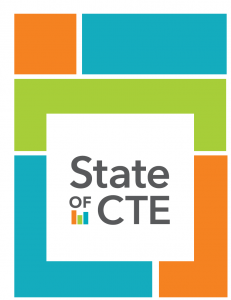 States make significant contributions to CTE programs through non-categorical, line item appropriations. Programmatic funding is distributed through periodic, legislatively established authorizations that are contingent on the availability of funds. States often place conditions on how money should be spent or used to promote state priorities. Additionally, a programmatic line item appropriation can be a recurring or a one-time investment. This blog highlights appropriations in industry-recognized credentials, Career Technical Student Organizations (CTSOs), career advisement, and educator preparation for fiscal year (FY) 2022. You can read more about categorical funding in the first blog in this series,
States make significant contributions to CTE programs through non-categorical, line item appropriations. Programmatic funding is distributed through periodic, legislatively established authorizations that are contingent on the availability of funds. States often place conditions on how money should be spent or used to promote state priorities. Additionally, a programmatic line item appropriation can be a recurring or a one-time investment. This blog highlights appropriations in industry-recognized credentials, Career Technical Student Organizations (CTSOs), career advisement, and educator preparation for fiscal year (FY) 2022. You can read more about categorical funding in the first blog in this series,  Additional Resources
Additional Resources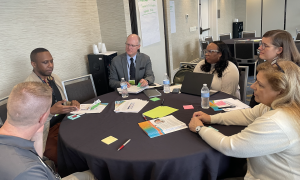
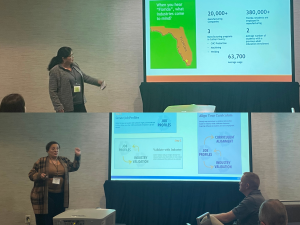
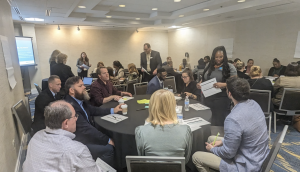
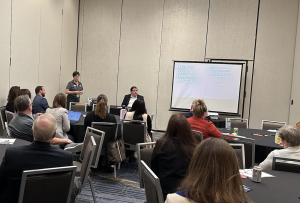
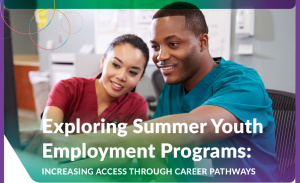
 One recent dissertation,
One recent dissertation, 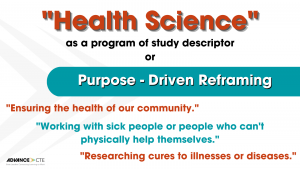
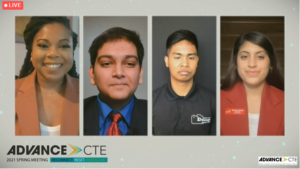

 Over the past year, Advance CTE has worked with state and national partners to modernize The National Career ClustersⓇ Framework (The Framework). Through kitchen cabinets, stakeholder engagement sessions, and town halls with our members, we collected a ton of great information about the purpose and the users of The Framework, its value, and where it no longer fits with the modern and future world of work. We recognize that The Framework has lived its useful life.
Over the past year, Advance CTE has worked with state and national partners to modernize The National Career ClustersⓇ Framework (The Framework). Through kitchen cabinets, stakeholder engagement sessions, and town halls with our members, we collected a ton of great information about the purpose and the users of The Framework, its value, and where it no longer fits with the modern and future world of work. We recognize that The Framework has lived its useful life.